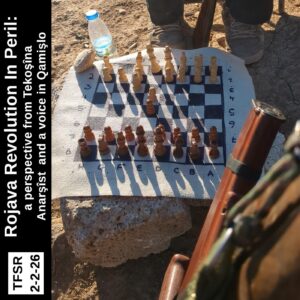02-03.02.26
Implementation of Jan 30 agreements
Following the agreement with SDF a convoy STG personal entered the cities of Hasakah and Qamishlo. They are tasked to coordinate the integration of SDF into the new Syrian army and the political structures of the DAANES into the SYrian State. SDF and other structures of NES proposed . SDF answered the request of proposals for some key postitions with the following candidates:
– Noureddine al Ahmad, former SDF public relations officer, as the Hasakah Province governor.
– Azad Kobani, SDF intelligence chief, as the Syrian assistant defense minister.
– Siamand Afrin, SDF unespecified commander, as the Hasakah Province deputy director of security
Unidentified attackers tried to assault the STG convoy is Qamishlo, with Asayish responding to prevent further conflict, resulting in one Asayish injured.
Syrian authorities report positive start to SDF Agreement.
Information published on Jan 30 Agreement:
Al Majalla, a Saudi-owned, UK-based media outlet, published the full text of the January 30 agreement. Allegedly it includes fourteen clauses and four unspecified phases that will occur over one month, as well as a fifth phase that will result in a permanent agreement
The SDF and Syrian Government declared a permanent and comprehensive ceasefire and agreed to stop arrests related to recent fighting. The SDF will continue to protect detention facilities holding ISIS fighters, and the Syrian government pledged to provide full logistical support for the ongoing US-led detainee relocation process.
The SDF will withdraw its forces from Hasakah and Qamishli cities to agreed-upon bases, while the Syrian army will withdraw its forces near Hasakah City to al Shadaddi.
The Syrian Ministry of Defense (MoD) agreed to form a three-brigade army division in Hasakah Province made up of SDF fighters.
The MoD will integrate SDF forces in Kobani into one brigade subordinate to an unspecified parent division in Aleppo Province.
The Ministry of Interior (MoI) will dispatch “15 vehicles” to both Hasakah and Qamishli cities to enhance security and begin the process of integrating SDF internal security forces into the MoI.
The SDF will submit proposals to appoint local officials, including the governor of Hasakah Province, the assistant minister of defense, and Hasakah Province’s deputy director of security. The Syrian government has already appointed a new Hasakah Province director of security.
The Syrian government will take over vital infrastructure from the SDF, including key oil fields in Hasakah Province and the Qamishli Airport.
The Syrian government will deploy a team from the Land Border Authority to the Semalka and Nusaybin border crossings in SDF territory to register civilian employees and prevent the smuggling of foreign fighters and weapons at the crossings.
The Syrian government will take over all civilian institutions in Hasakah Province and integrate the Autonomous Administration of North and East Syria (AANES) into Syrian state institutions.
The Syrian MoD will prevent its forces from entering Kurdish majority towns and cities.
The Syrian government will validate all school, university, and institutional certificates issued by the AANES.
The Syrian government will provide licenses to all local and cultural organizations and media institutions in accordance with the regulations of the relevant ministries.
The Syrian Ministry of Education and the SDF will discuss the educational curriculum for the Kurdish community.
The Syrian government will ensure the return of all internally displaced persons (IDPs) to their respective cities and villages (including Afrin, Sheikh Maqsoud, and Ras al Ayn) and appoint local officials to those areas.[28] Turkish-backed offensives against the SDF since 2018 forcibly displaced Kurds from Afrin and Ras al Ayn, and the more recent January 2026 Syrian government offensive displaced people across Aleppo, Hasakah, Raqqa, and Deir ez Zor Provinces.
Ongoing transfer of ISIS prisoners
Iraq confirms the transfer of over 1300 ISIS prisoners after the operations of transport got delayed due to bad weather conditions. Speaking in an interview with Al Arabiya news channel, Khaled al-Yaqubi, an adviser to the Iraqi prime minister, said that only four of the transferred ISIS members are Iraqi nationals. Earlier on Monday Iraq announced the start of investigative procedures involving 1,387 ISIS members who had been detained in Syria.
Evaluation:
The implementation of the agreements between SDF and STG is having some visible steps in the main cities, but on the front lines the situation still tense. Comrades are still ready to defend the ground if things come to a military escalation, not lowering defenses. Eventhough the political and the military are inherently connected, SDF forces are aware that political agreements should not mean lowering military readiness.
It is a difficult moment for us to evaluate the situation. On one hand this agreement may be an opening ground for political struggle beyond weapons. On the other, many comrades on the ground are having doubts about the agreements, mainly about how much the transitional goverment will respect the conditions set, as they already broke past agreements. Still, it is clear that the popular organization in NES still strong and ready to struggle, whatever it will be on the frontlines, on the political institutions or on the streets.
Revolutionary greetings!

